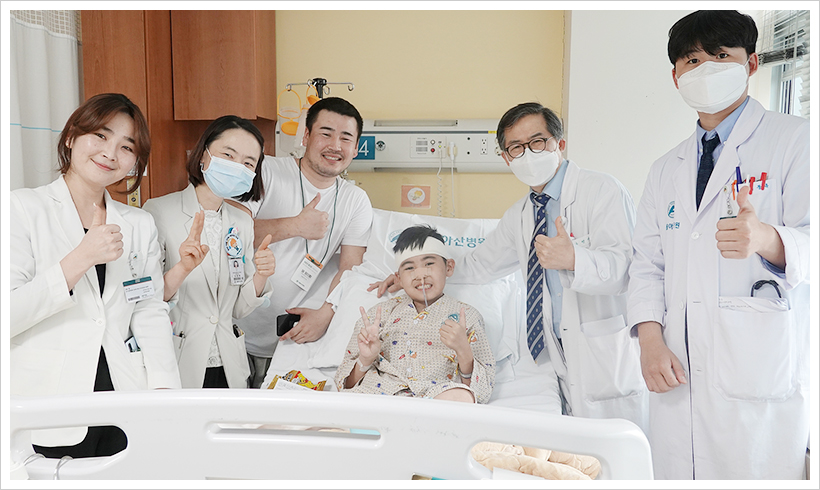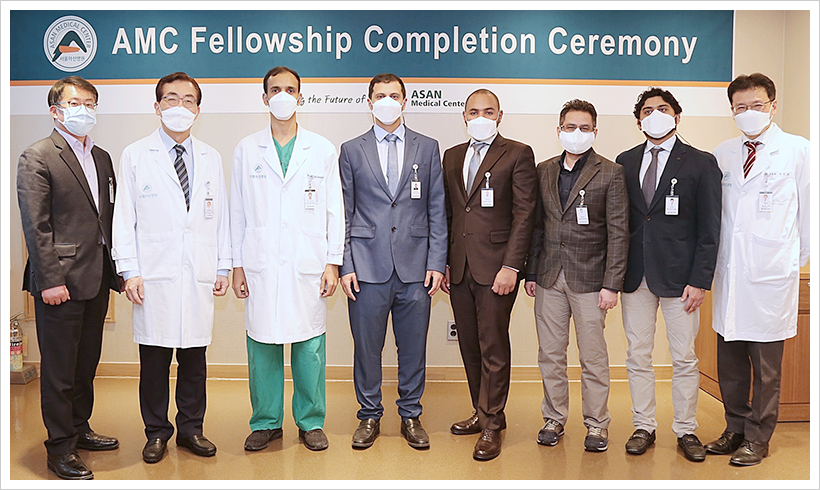RELATED Live.
- About us
- KIMA Members
-
KIMA Doctors
- All
- Anesthesiology
- artificial joint center
- Breast and Endocrine Surgery
- Breast cancer and thyroid cancer center
- Breast Surgery
- Cardiology
- Cardiothoracic Surgery
- Cerebrovascular Center
- Colorectal Surgery
- dental and maxillofacial surgery
- Dermatology
- Endocrinology
- Gastroenterology
- General Surgery
- Genito-Urology
- Hematology
- Hemato-oncology
- Infection Center
- Internal Medicine
- International Healthcare Center
- Korean Medicine
- liver center/Pancreas and billiary tract center
- Liver Transplantation
- Neurology
- Neurosurgery
- Obstetrics & Gynecology
- Ophthalmology
- Orthopedic
- Otorhinolaryngology
- Pediatric & Juvenile
- Pediatric Allergy and Respiratory Diseases
- Pediatric Gastroenterology
- Pediatric Neurology
- Pediatrics
- Physical Medicine & Rehabilitation
- Plastic & Reconstructive Surgery
- plastic surgery
- Pulmonology
- Radiation oncology
- Rheumatology
- Thyroid & Endocrine Surgery
- Urology
- Vascular Surgery
- KIMA News
- KIMA Live
- Community
KIMA NEWS
Last year, 12,000 foreign patients ···
did not mind inconvenience including self-quarantine for the seriously ill.
More than 100 foreign medical scientists from the Middle East and other countries took
training safely along with online training.

△ Temuren, a 10-year-old Mongolian boy, who flew to Asan Medical Center for brain tumor surgery last April despite COVID-19, is taking a memorable picture with the medical staff who treated him. Dr. Young-shin Na, a professor of pediatric neurosurgery of Asan Medical Center, who conducted the surgery posed second from the right.
Last April, when COVID-19 hit the whole world, Temuren (10-year-old male) suddenly felt a severe headache while playing in the Mongolian grasslands. He was rushed to the emergency room and found his disease, ependymal glioma. Although it is a brain tumor that occurs frequently in children, it was not easy to be treated in Mongolia.
To Temuren’s parents, the local medical staff cautiously suggested that Temuren go to Korea. Due to the COVID-19, overseas travelers had to self-isolate for two weeks and could go to the hospital only confirmed negative from the COVID-19 test, but his parents were sure they could put up with any inconvenience as long as Temuren could endure well and receive better treatment.
Fortunately, after completing the quarantine safely, they met Temuren’s attending doctor, Dr. Young-shin Na, a professor of pediatric neurosurgery at Asan Medical Center. Dr. Na performed an emergency operation on Saturday even though it was his off, considering that Temuren's brain tumor was quite advanced.
After surgery, 99% of the tumor was removed, and the remaining 1% completely was gone through radiation therapy. Temuren recovered quickly and was able to return safely to his family in Mongolia.
Despite the COVID-19, it has been found that the seriously ill as well as medical scientists from overseas visit Asan Medical Center, even though they should go through long period of self-quarantine, multiple COVID-19 tests, and even the possibility of virus infection while traveling, only to have better medical care.
According to Asan Medical Center, the number of foreign patients treated at Asan Medical Center last year reached 12,000. By nationality, the U.S. accounted for the largest share (30%) with 3,527 persons, △UAE 1,314 (11%) △China 1,145 (10%) △Mongolian 1,054 (9%) △Saudi Arabia 968 ( 8%) △Kazakhstan 624 (5%) followed.
In the early COVID-19, the number of foreign patients inevitably decreased, but it has been steadily recovering back to the figures before COVID-19 from last winter. This year, the second year of the epidemics outbreak, the recovery was even more distinct. From January to May this year, the monthly average number of patients from overseas exceeded 1,000 with about 20% increase compared to that of last year.
It is even more difficult for seriously ill patients abroad, who can no longer be treated in their own country, to travel abroad in the midst of pandemics. There are many obstacles to overcome before seeing a doctor, including two weeks of quarantine and PCR test regardless of their physical condition. Above all, before arriving at the hospital, they should consider the worst case that their symptoms may worsen, and that can impose a big mental burden to the patients.

△ In the picture, medical scientists from the Middle East are taking pictures to commemorate the completion of their training, after they took training at Asan Medical Center in 2020. Second from the left is Dr. Young-tak Kim, head of the International Business Department (Professor of Obstetrics and Gynecology), Asan Medical Center, Seoul.
Asan Medical Center has established standard guidelines for all services that patients encounter, from treatment to anesthesia to surgery, including an infection control system for the first time in Korea so that they could provide world-class standard medical services to critically ill patients.
Accordingly, foreign patients can receive safe and high-quality treatment even during the pandemics, which leads the critically ill to seek to see a doctor of Asan Medical Center.
In fact, Asan Medical Center performed 130 living liver transplants (January to March 2020) without any problems even when kidney and pancreas transplants were temporarily put off due to COVID-19 at the organ transplant management center in the United States. Still, it was reported that hospital quarantine and transplantation were successfully performed as well as evaluated that the infection control for the transplant subject was well managed.
In particular, during COVID-19, Asan Medical Center has performed the world's first liver transplantation 7,000 cases, Asia's first △aortic valve stenting 1,000 cases, △ esophageal cancer robotic surgery 500 cases, Korea's first △kidney transplantation 6,000 cases △ heart transplantation 800 cases △breast cancer surgery 35,000 cases △colorectal cancer surgery 33,000. Setting remarkable records as such amidst of pandemics, Asan Medical Center has faithfully fulfilled the true role of treating patients.
In September last year, a Korean in his 50s lost all lung function due to pulmonary fibrosis after he suffered from the infection of COVID-19 in Mexico. From the other side of the world, he was urgently transported to Asan Medical Center in Seoul, and then underwent a lung transplant. Now he miraculously recovered his health.
For the foreign patients, family care givers, and the general public who cannot visit Asan Medical Center in person, online channels are available to help them get informed of diseases and treatments.
As the access to online platforms expanded due to COVID-19, the proportion of overseas viewers of YouTube channel of Asan Medical Center also increased significantly. It got more than doubled from 11.7% in 2019 to 31% in 2020. The number of views in the United States, the main audience, more than doubled from 294,742 in 2019 to 655,466 in 2020, and more than five times (37,057 → 188,229) in Japan.
In order to deliver accurate medical information to more foreign patients, Asan Medical Center provides subtitles in English, Chinese, Russian, Arabic, Mongolian, and other languages to YouTube videos including information about diseases and patient cases.
On the other hand, visits of foreign medical doctors as well as patients have consistently increased. Asan Medical Center has temporarily paused its own training program since the middle of last year, considering the shortage of medical personnel due to the paralysis of medical systems around the world and the quarantine of hospitals.
Still, more than 100 foreign medical scientists, including medical practitioners from the Middle East, visited through contracts between the existing long-term trainees and countries and received training safely during COVID-19.
For 10 years before the outbreak of COVID-19, more than 3,600 medical practitioners from 90 countries including the United States, China, Mongolia and Saudi Arabia learned the latest medical technology, cutting-edge research, and efficient medical management system from Asan Medical Center.
This year, in-person training was inevitably limited, but Asan Medical Center took the crisis as an opportunity to provide online education. Dr. Hoon-yong Jung, a specialist of gastroenterology demonstrated the latest gastroscopy procedure to foreign medical doctors in real time using Zoom, an online video platform, and received a great response from the training participants.
Dr. Young-tak Kim, head of international business department (professor of obstetrics and gynecology) at Asan Medical Center, said, “I believe that foreign patients with severe symptoms as well as medical practitioners continue to visit Asan Medical Center because they can experience high-quality medicine in a safe environment.
Also, he added, “The training program, which was temporarily suspended, will resume as soon as possible considering the vaccination trend around the world, so that the excellent medical technology of Asan Medical Center can be shared.”
Inquiry